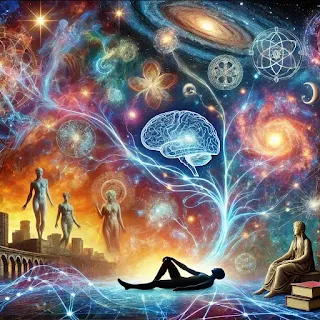Dreams are fascinating phenomena that intersect various aspects of human culture, science, and philosophy. Here's an overview of how dreams are viewed through different lenses:
Neuroscience:
Dreams occur during the REM (Rapid Eye Movement) phase of sleep, characterized by increased brain activity, rapid eye movements, and vivid dreaming. The brain processes memories, emotions, and information during this time, which may contribute to dream content.
Psychology:
Sigmund Freud suggested dreams are a manifestation of our unconscious desires and thoughts. Carl Jung proposed that they are a reflection of the collective unconscious, filled with archetypes and universal symbols.
Superstition:
In many cultures, dreams are seen as omens or messages from the supernatural. For example, a dream about teeth falling out might be interpreted as a bad omen.
Beliefs:
Some cultures believe that dreams are a way to communicate with the divine or with deceased ancestors. In indigenous cultures, dreams are often considered spiritual journeys or visions.
Customs of Dream Interpretation:
Many societies have customs of interpreting dreams to predict the future or gain insights into personal issues. Books on dream interpretation are common in many cultures.
Rituals:
Some cultures practice rituals to induce specific dreams or protect against nightmares, such as placing amulets under the pillow or performing specific prayers.
Misinterpretation:
Relying too heavily on dreams for decision-making can lead to irrational choices, as dreams may not always have clear or meaningful interpretations.
Mental Health:
Frequent nightmares or disturbing dreams can be a sign of underlying mental health issues, such as anxiety or PTSD, and may require professional attention.
Daily Life Influence:
Our waking life experiences significantly influence the content of our dreams. Stress, relationships, and daily activities can shape what we dream about. Lucid Dreaming: Some people practice techniques to become aware of and control their dreams, which can be used for personal growth or creativity.
Nature of Reality:
Philosophers have long pondered whether life itself is a dream. Descartes questioned the reliability of our perceptions, wondering if we could ever be sure we were not dreaming.
Existential Themes:
Dreams often explore themes of identity, purpose, and reality, prompting philosophical reflection on the nature of existence. Symbolism and
Allegory:
Dreams have been used as literary devices to explore complex themes and emotions. Authors like Lewis Carroll and Franz Kafka used dream-like narratives to delve into the human psyche.
Imagination:
Dreams in literature often serve as a canvas for exploring the boundaries of imagination and creativity.
Boundless Possibilities:
In fantasy genres, dreams can transport characters to other worlds, offer prophetic visions, or serve as a means of magical communication.
Escapism:
Dreams offer an escape from reality, allowing exploration of scenarios and worlds not possible in waking life.Dreams continue to captivate and inspire, serving as a bridge between the conscious and unconscious, the real and the fantastical. They offer a unique lens through which to explore the complexities of human experience.


Informative writing
ReplyDelete